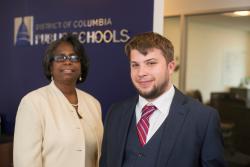Alumnus Helps Special-Needs Students Transition to Higher Ed, Work
Bachelors of Arts in Government and International Politics, George Mason University
Bachelors of Arts in Conflict Analysis and Resolution, George Mason University
 |
 Chris Nace was 12 years old when he realized his life’s calling was to make it easier for special-needs students to navigate their educational careers.
Chris Nace was 12 years old when he realized his life’s calling was to make it easier for special-needs students to navigate their educational careers.
As it happens, Nace has special needs himself. His cerebral palsy impacts his upper extremities, a complication he has never regarded as a handicap. It was others, he says, who handicapped his ambitions.
“I grew up in a situation where I had parents who were not involved in the [Individualized Education Program] process, and a school system that didn’t always actively act as an advocate for me,” he says. “I had to learn to become my own advocate at an early age.”
The Hopewell, Va., native resolved to change the system from the inside, an academic path that led him to George Mason University’s School for Conflict Analysis and Resolution, where this spring he graduated with a master’s degree in conflict analysis. Before graduation he landed a job with the District of Columbia Public Schools as a post-secondary transition specialist, where he shocked his supervisor by working with a team to develop 63 new courses in his first months. These courses feature “transition-based skills, like conflict resolution and self-advocacy—work-based skills to teach students what they need to be successful in the work environment,” he says. “That’s really what resonates with me.”
 “I wasn’t concerned that he was coming from a policy background,” says Pamela Downing-Hosten, the DC public schools transition director. “Chris believed the way to change policy in education was to change the mindset of education stakeholders.” Downing-Hosten adds that Nace has since learned teaching skills to complement his policy skills.
“I wasn’t concerned that he was coming from a policy background,” says Pamela Downing-Hosten, the DC public schools transition director. “Chris believed the way to change policy in education was to change the mindset of education stakeholders.” Downing-Hosten adds that Nace has since learned teaching skills to complement his policy skills.
Downing-Hosten says what Nace is doing has caught the eye of other school system supervisors who are eager to incorporate DC public school courses into their programs; the DC schools teach preparedness at an early age—pre-kindergarten, continuing through 12th grade. “Other school systems hadn’t heard of that,” she says. She and Nace brainstorm each morning at 7 a.m. for more than an hour to discuss how to improve the programs, and even at this early stage, she says, the positive results “are measurable, in academic development and career preparedness” for students transitioning out of the school system.
For Nace, what he’s doing is not just professional, it’s personal.
“Through the years I didn’t always get what I needed to get through the school system, and sometimes my disability became a hindrance to success instead of an element of my success,” Nace says.
“I’m furthering my personal experience. I like to see students becoming more successful irrespective of whether they have a disability. A disability should not disenfranchise them from the overall success of life.”
As Nace travels the country as a keynote speaker at national transitioning conferences, he’s become known for his self-advocacy course. “This is not done anywhere else in the country,” he says. “It’s now taught at every grade level [in the DC public schools] to help students to be self-aware and to be able to understand what their abilities and limitations are, and how their disability affects them so when they do go to college or work they’re able to articulate what they need to be successful.”
For example, one of Nace’s courses requires students with autism or intellectual disabilities to visit places like Union Station and to teach vendors how to work with these individuals when they come in to shop. “We’re trying to change the stigma of disability in society,” Nace says.
He attributes George Mason’s School for Conflict Analysis and Resolution for teaching him “how to articulate and to teach individuals how to be self-reflective as a trait of teaching others. We want students to teach each other.”
While Nace seems to have his professional career path sorted out, his education isn’t over. “I think I’m coming back to George Mason for my doctorate in special education,” he says.
###
Photo Credits: Alexis Glenn, Creative Services, George Mason University.
Photo #2: Mason alumnus Chris Nace has been working with Pamela Downing-Hosten, the transition director at the District of Columbia Public Schools, to develop course work for special-needs students.
This material is presented as the original analysis of analysts at S-CAR and is distributed without profit and for educational purposes. Attribution to the copyright holder is provided whenever available as is a link to the original source. Reproduction of copyrighted material is subject to the requirements of the copyright owner. Visit the original source of this material to determine restrictions before reproducing it. To request the alteration or removal of this material please email [email protected].
rosters
IMPORTANT LINKS
- Home
- Admissions
- Academics
- Research & Practice
- Center for Peacemaking Practice
- Center for the Study of Gender and Conflict
- Center for the Study of Narrative and Conflict Resolution
- Center for World Religions, Diplomacy, and Conflict Resolution
- Indonesia - U.S. Youth Leadership Program
- Dialogue and Difference
- Insight Conflict Resolution Program
- Parents of the Field Project
- Program on History, Memory, and Conflict
- Project on Contentious Politics
- Sudan Task Group
- Undergraduate Experiential Learning Project
- Zones of Peace Survey
- News & Events
- Student and Career Services
- Alumni
- Giving




